Rethink Your Health in 2022
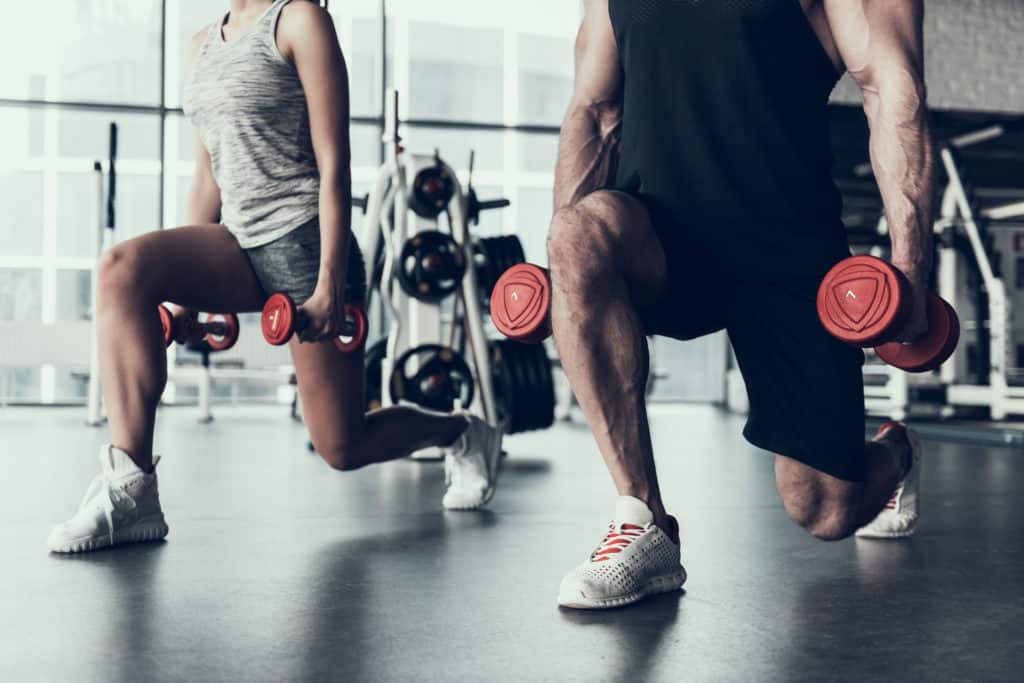
By Kathy Knotts
Throw out those old calendars; a new year is upon us. The beginning of January has long signaled to Americans a time to re-evaluate the state of our lives, or at least to think about what our lives will look like in the fresh unwritten pages of our day planners.
We tend to think about all the ways we want to change our lives and start etching out resolutions to make change happen. Or just recover from an over-indulgent holiday season.
Typically, our health becomes front and center at the start of a new year. The new year is a chance to replace some unhealthy habits with better activities or philosophies.
Is this the year that you change how you think about your health? Perhaps this is the year you dip a toe into veganism or maybe this is the year you learn how to stop dieting forever and embrace your health with a different measurement? Maybe you want to add fitness to your schedule and are looking at how to make that happen—and make it last the whole year through?
We turned to a few experts for some guidance on all these topics and asked them how we can rethink health in 2022.
Opt Out of Dieting
One of the most common resolutions for Americans will be to lose weight. And the marketing departments of weight loss companies know this is their time. New Year’s is like Black Friday for any company involved in diet culture.
You need only spend five minutes scrolling on any social media platform and you will see ads for programs like Noom, Weight Watchers, Beachbody, and more—all with a message that our bodies need to change.
“This is a $72 billion industry that profits off people’s insecurities,” says Elizabeth Harris, a registered dietitian in Severna Park. “All the messages we see in our world that tell us our bodies aren’t good enough, that we need to change them and lose weight—that’s diet culture.”
Harris teaches a different philosophy about food and nutrition as a certified Intuitive Eating counselor. She says that making peace with our bodies and the foods we choose is much more important than a number on the scale.
“Research is clear that diets don’t work,” she says. Instead of restricting foods, Harris and a multitude of other authors and dietitians focus on helping people heal from a belief that thinness and appearance are the most important aspects of life.
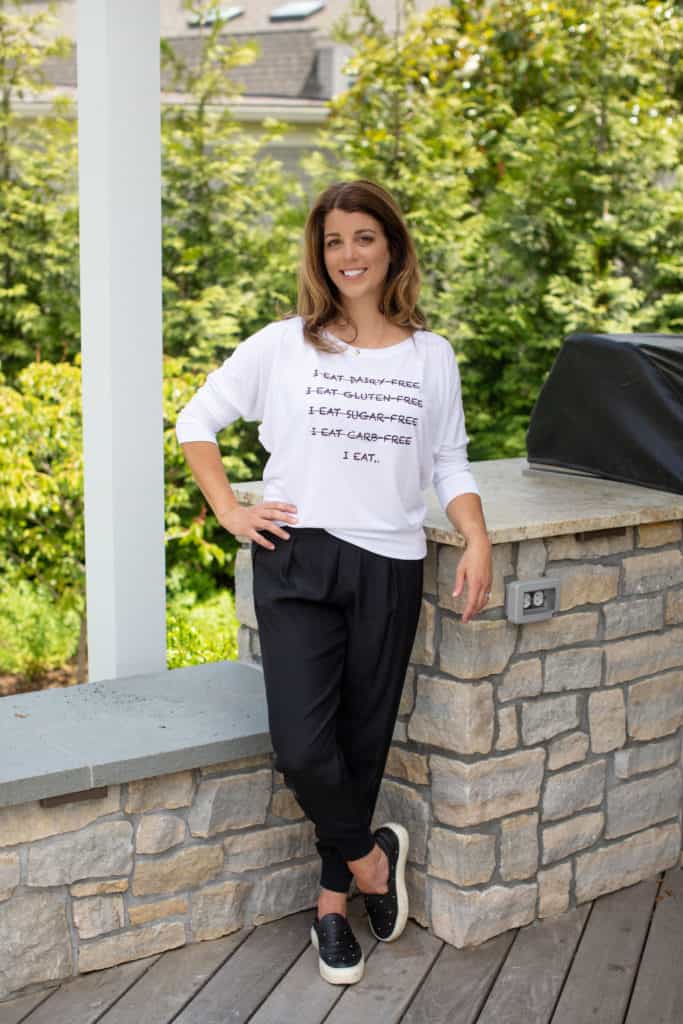
The anti-diet movement first got a lot of attention when authors and dietitians Evelyn Tribole and Elyse Resch published their book Intuitive Eating in 1995. The authors called the approach a “self-care eating framework, which integrates instinct, emotion, and rational thought.”
Instead of focusing on weight loss and a number on the scale, intuitive eating proponents focus on health-promoting behaviors and feeling better in one’s body.
“I help people learn how to heal their relationship with food and their bodies…shift their focus from self-control to self-care,” says Harris. “We want to think about our behaviors, other measures of health and recognize that healthy bodies can come in all shapes and sizes and honoring that.”
Harris says that she often works with people who have spent a great deal of time, energy, and money dieting. “They’ve tried it all. And they’ve experienced a lot of yo-yo gains and losses. They are ready to end the battle and find a different way of nurturing their whole body health.”
There are many voices in the anti-diet crowd, although they can be harder to find. “Diet culture is loud,” says Harris. “The anti-diet, food and body positivity movement is gaining ground though.” She recommends starting with Intuitive Eating by Tribole and Resch and Anti-Diet by Christy Harrison.
Then, start opting out of diet culture and its messages. “This could be unfollowing influencers or unsubscribing from sites that promote dieting. Start paying attention to what diet culture looks like and how it makes you feel. Then you will know how to minimize it in your life.”
Diet culture likes to moralize food and bodies, she says. “Negative messages about food—this is ‘bad’ or this is ‘good’ or ‘clean’—that’s diet culture. Your ‘good’ or ‘bad’ food choices almost become an extension of yourself in this mindset…. Give yourself permission to eat and enjoy all foods. Learn your hunger and fullness cues.”
While nothing is “off-limits” in intuitive eating, Harris notes that the approach is not a license to binge or shrug off physical health altogether. “It is absolutely not anti-health…we look at physical, emotional, and mental well-being…being stressed about your food choices isn’t healthy.”
Health-promoting behaviors to embrace instead of dieting are things like finding enjoyable (Harris calls it “joyful”) movement that you like to do consistently. Don’t exercise in a punishing way—“earning” your calories or burning a certain number.
Add more fruits, vegetables and fiber to your meals. Manage your stress. Get plenty of sleep. See your doctor regularly. All are ways to embrace health without focusing on the scale.
Learn How to Break Up with Dieting for Good in a free 5-day course with Elizabeth Harris: https://elizabethharrisnutrition.com/how-to-break-up-with-dieting-for-good.
It’s Veganuary
Daniel Bastion of Annapolis recently wrote to CBM Bay Weekly to remind us that a new year is the perfect time to embrace a new way of eating.
“With Christmas and Hanukkah behind us, we look forward to the new year and New Year’s resolutions: to step away from social media, lose some weight, and, perhaps, to go vegan. Yes, that.”
The basic tenet of veganism is swapping plant-based foods for animal ingredients such as meat, fish, eggs, and dairy. But what does it mean exactly to be vegan? It used to be the eating style most associated with animal rights activists and extreme environmentalists. Not anymore. Veganism has hit its stride.
“I think it’s statistically undeniable that veganism is becoming more common. It’s also becoming more socially/culturally acceptable and even trendy (used non-pejoratively here!),” says James of AnnapolisVegan (last name withheld by request). “That said, the negative, visceral reactions I’ve received from people who find out about my lifestyle have been extremely surprising. People are much more attached to their diets and food traditions than I realized. They see it as an intrinsic part of their being, which I guess I never did. Also, there’s a lot of the stereotypical meat-eating male machismo, but it doesn’t bother me. Women in general seem more receptive and ask a lot of questions about it.”
In his letter, Bastion states that “A third of consumers report reducing consumption of animal foods. Hundreds of college campuses, schools, hospitals and corporate cafeterias have embraced Meatless Monday. Even fast-food chains like Chipotle, Burger King, Subway, and Taco Bell have rolled out plant-based options. Now McDonalds is hinting at a plant-based burger in 2022.”
So if major food companies are jumping on the meat-free bandwagon it only makes sense that going vegan is all over social media. Perhap you have seen the hashtag #veganuary. (It’s pronounced vee-GAN-you-air-ee, in case you’re curious). What started as a UK-based nonprofit encouraging people to try a vegan or plant-based diet for the month of January is now spreading into the newsfeeds of Americans. Veganuary.com claims that half a million people tried going vegan in their 2021 campaign, with participants from over 200 countries and territories. (It’s important to note that there are also a lot of ways to go vegan, including whole-food vegans, raw-food vegans, junk-food vegans, ethical vegans and dietary vegans.)
Alissa Kircher has been a vegan since 2013. While she initially ditched animal products because of her love for animals, she says the health benefits were almost immediate. “I didn’t really realize the health benefits at first,” she says. “But I was always sick before, I had all these aches and pains and I was in and out of doctors’ offices all the time. Once I eliminated animal products those aches and pains went away.”
Kircher dove straight into her new lifestyle, researching online and reaching out to vegan communities through social media. When she moved from D.C. to Leonardtown in 2014 though, she knew she needed to build the community she wanted. So Kircher co-founded the Southern Maryland Vegan Restaurant Week with fellow vegan Rebecca Burnett.
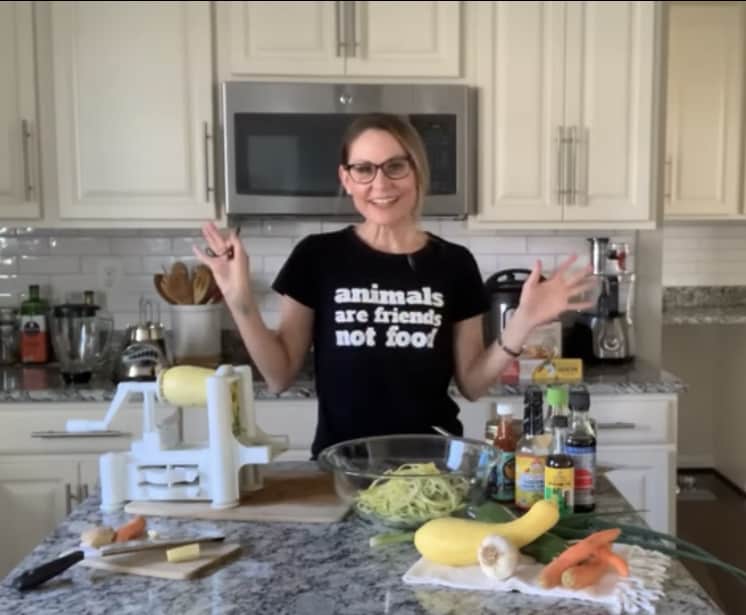
“Living here, I realized there was more and more interest from people wanting to eat more plant-based and plant-forward foods. I knew the interest was here, so we decided to reach out to area restaurants and show them the benefits of offering vegan dishes. There’s this whole group of untapped customers you are missing out on,” says Kircher.
Launched in 2019, the program started with 18 restaurants participating in the weeklong focus on vegan foods. “Everyone was really excited and now we see people coming in and asking for plant-based dishes, wanting more things on the menu. It really brought out a much larger community than we were ever aware of.”
Kircher now posts vegan recipes and tips to the Visit Leonardtown website and says area restaurants are adding more options to their menus.
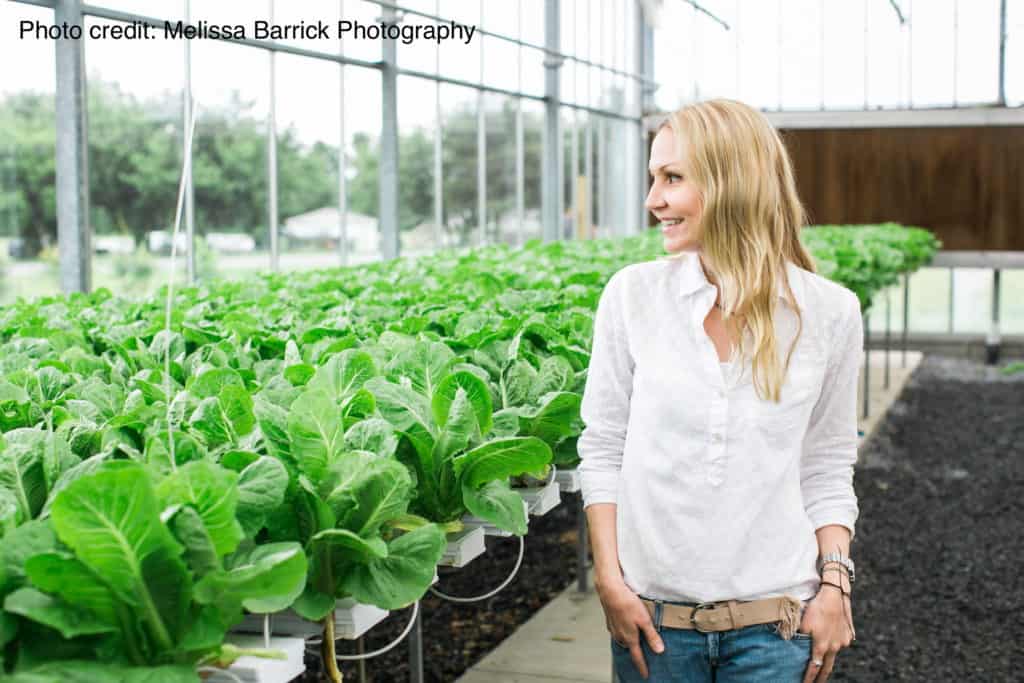
Alissa Kircher 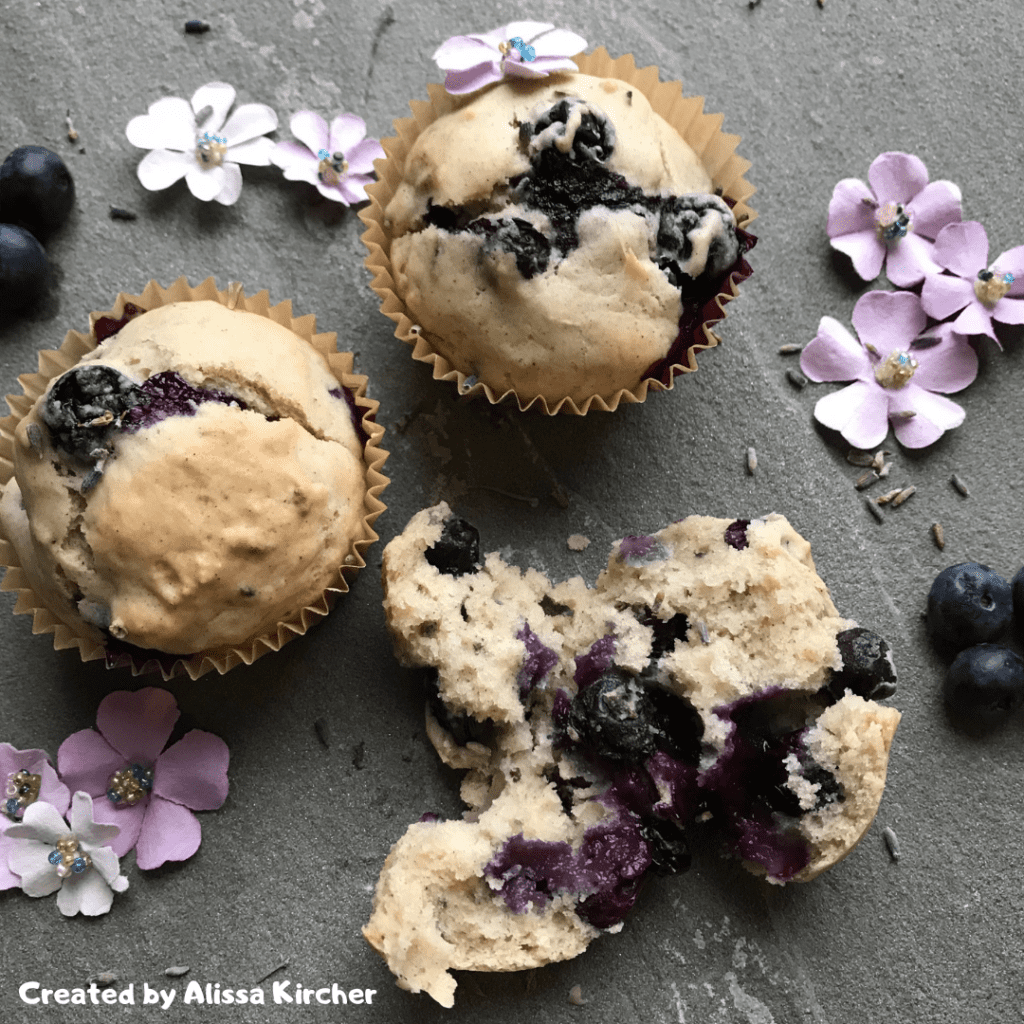
Vegan blueberry & lavender muffins 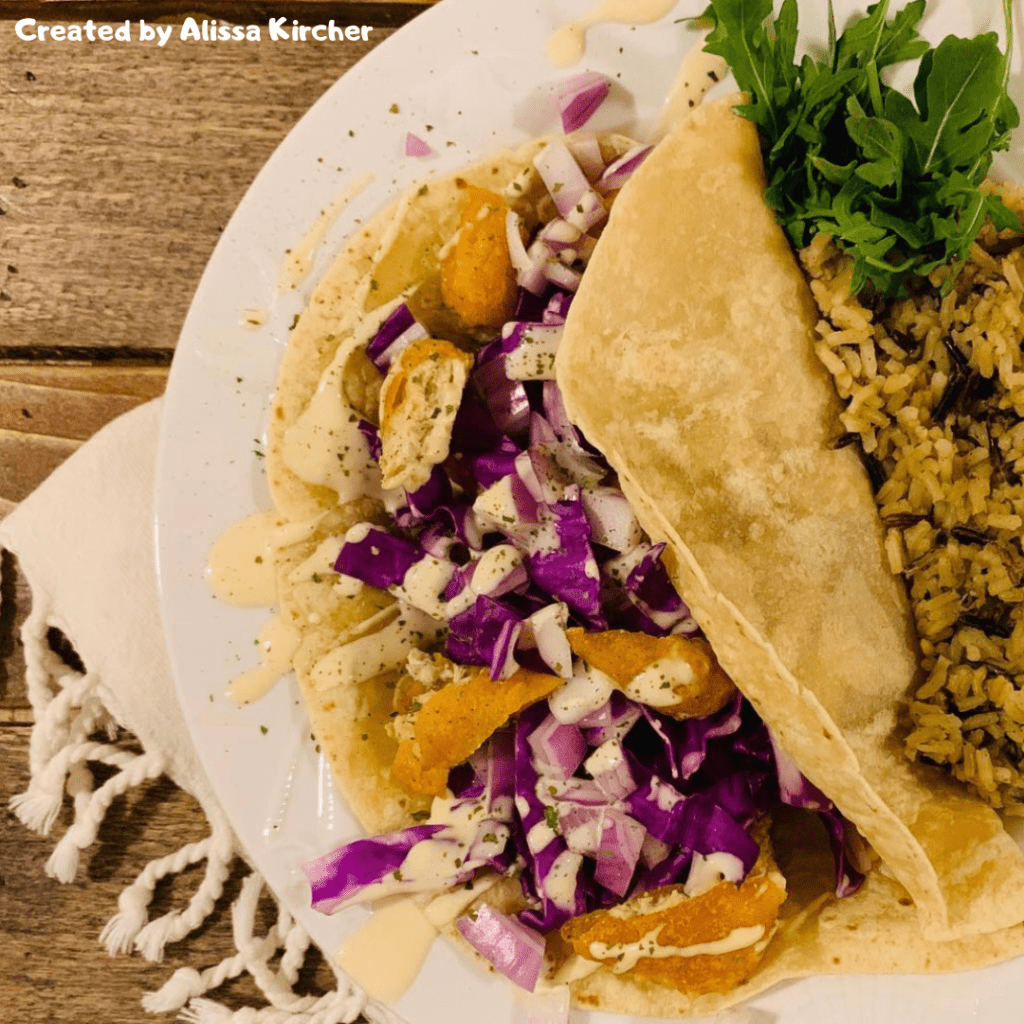
Vegan fish tacos 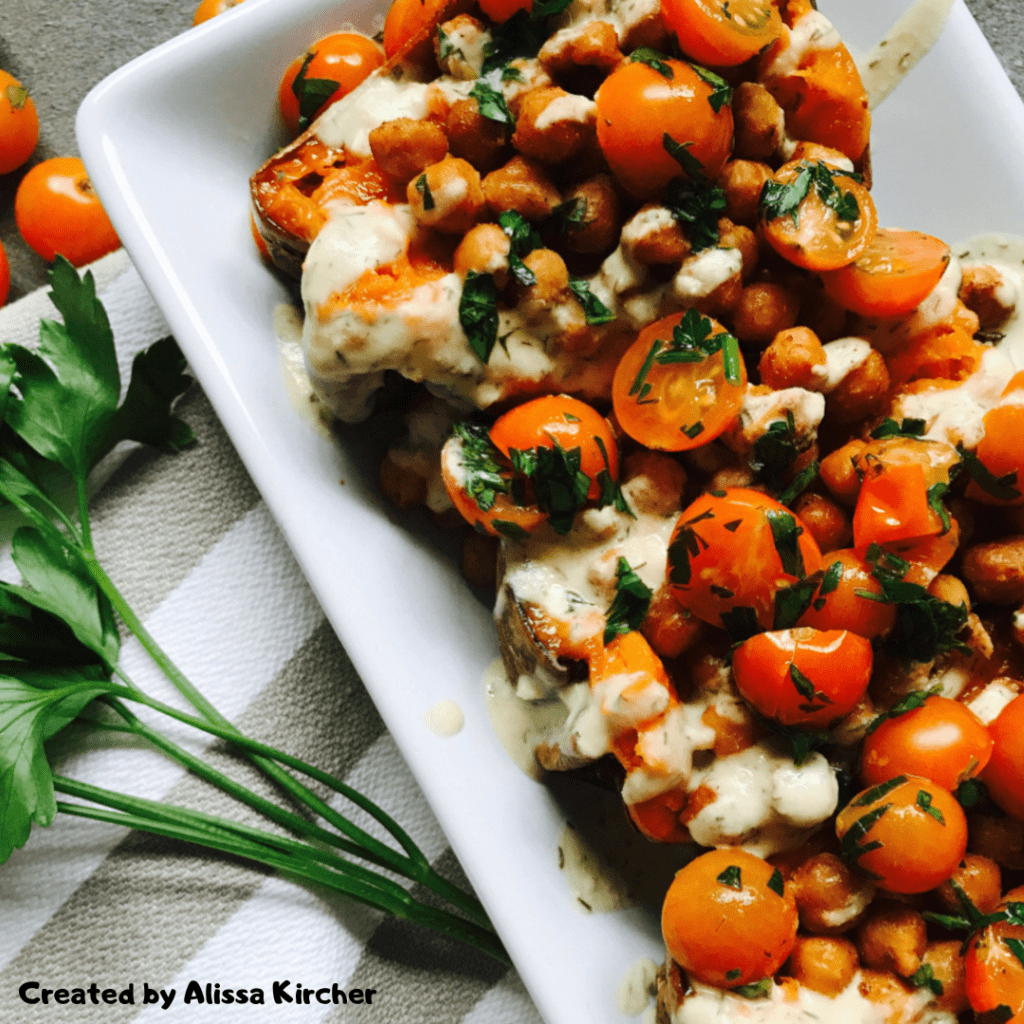
Vegan Mediterranean infused sweet potatoe 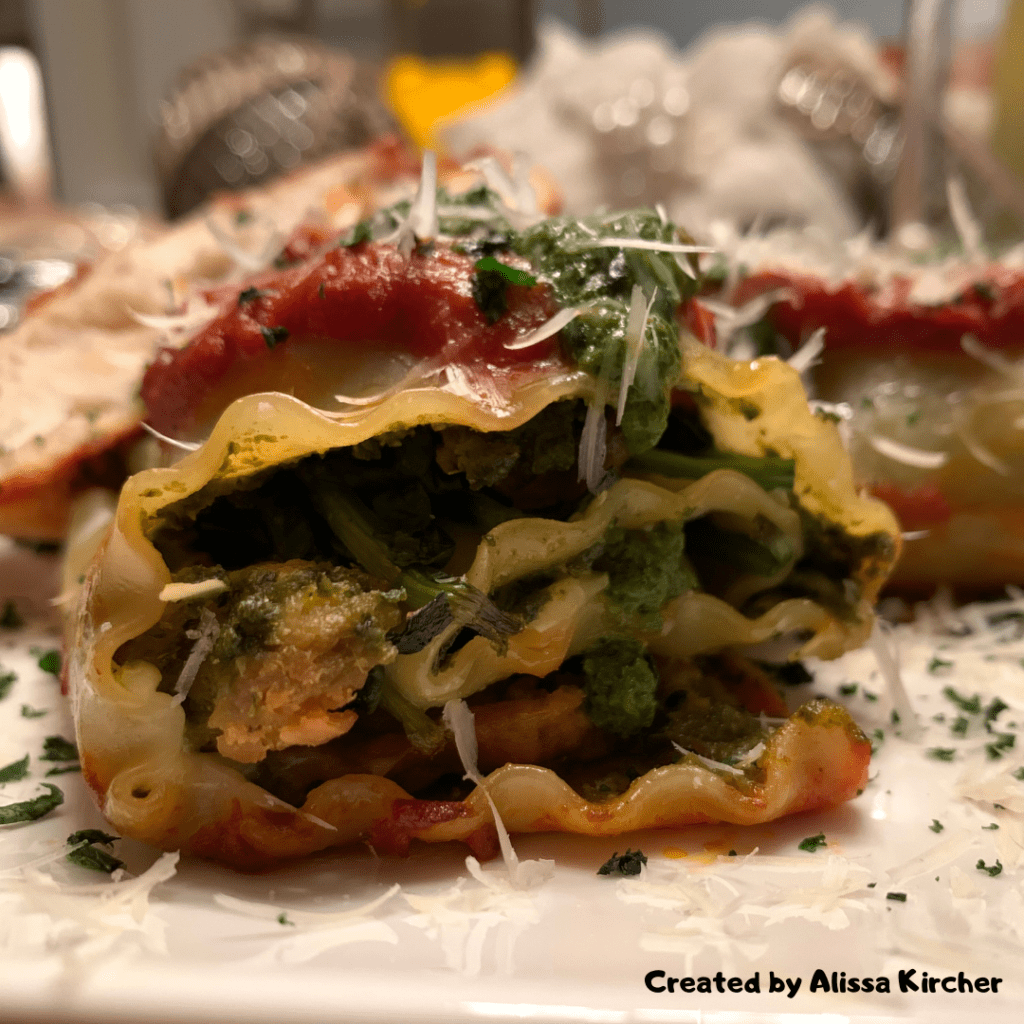
Vegan pesto chic’n roll-ups 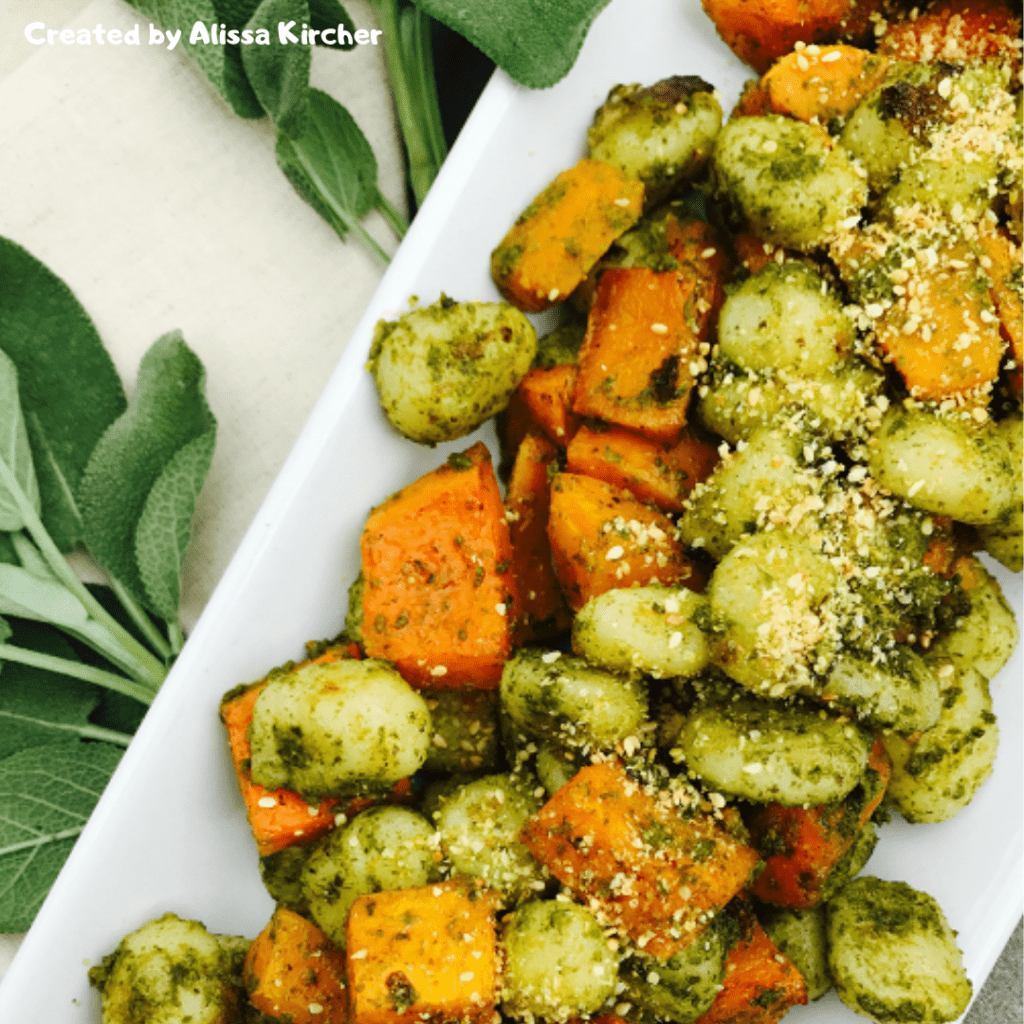
Vegan pesto gnocchi & butternut squash
How does our health benefit from ditching animal products and filling a plate with fruit, grains and vegetables? To start with, a vegan diet means a lower saturated fat intake. A diet free of meat and dairy naturally means one with less fat and more fiber, which may reduce the risk of heart disease and stroke. “There are a lot of myths and misconceptions about vegan diets,” says Kircher. “One is this concern about where we get our protein. The more important question is where are you getting your fiber? Fiber only comes from plant-based foods and it affects our gut health, which affects our immune system. Something like 95 percent of the U.S. population is deficient in fiber.”
Some vegans report better sleep quality, more energy, higher intake of antioxidants, vitamins, minerals and water, and weight loss.
Evidence on the health benefits of vegan diets comes from two large prospective epidemiologic studies: The Adventist Health Study-2 in North America, and the EPIC-Oxford study in England. Findings show that vegans typically have lower BMIs, a decreased risk of type 2 diabetes, reduced blood cholesterol levels, and a probable reduction in hypertension. Rates of heart disease are lower among vegan men but not women, and vegans may have a lower risk of certain cancers, reports Today’s Dietitian.
Switching to a vegan diet doesn’t have to be challenging. James from AnnapolisVegan says it was easy for him. “In fact, it was a bit of a relief. When you feel that you’re doing deep harm with an action, I don’t think it’s difficult to cease that action. It felt good to be honest with myself. Also, I buy a lot of cookbooks and love to cook at home, so having new boundaries pushed me to look in different directions for recipes. I actually found that to be a lot of fun.”
Kircher, on the other hand, recommends taking baby steps. “Try not to take an all-or-nothing approach. It can be overwhelming if you dive in all at once. Make a list of your favorite foods and then look at ways to replace them with plant-based foods. Just try it out. Do a little today, then do a little more tomorrow. But don’t beat yourself up if you can’t jump in 100 percent.”
Finding tasty dishes in area restaurants is easier than ever. Kircher suggests the vegetable muffuletta at Botanic Café in Leonardtown or the Kung Pao Brussels Sprouts at Ruddy Duck in Solomons.
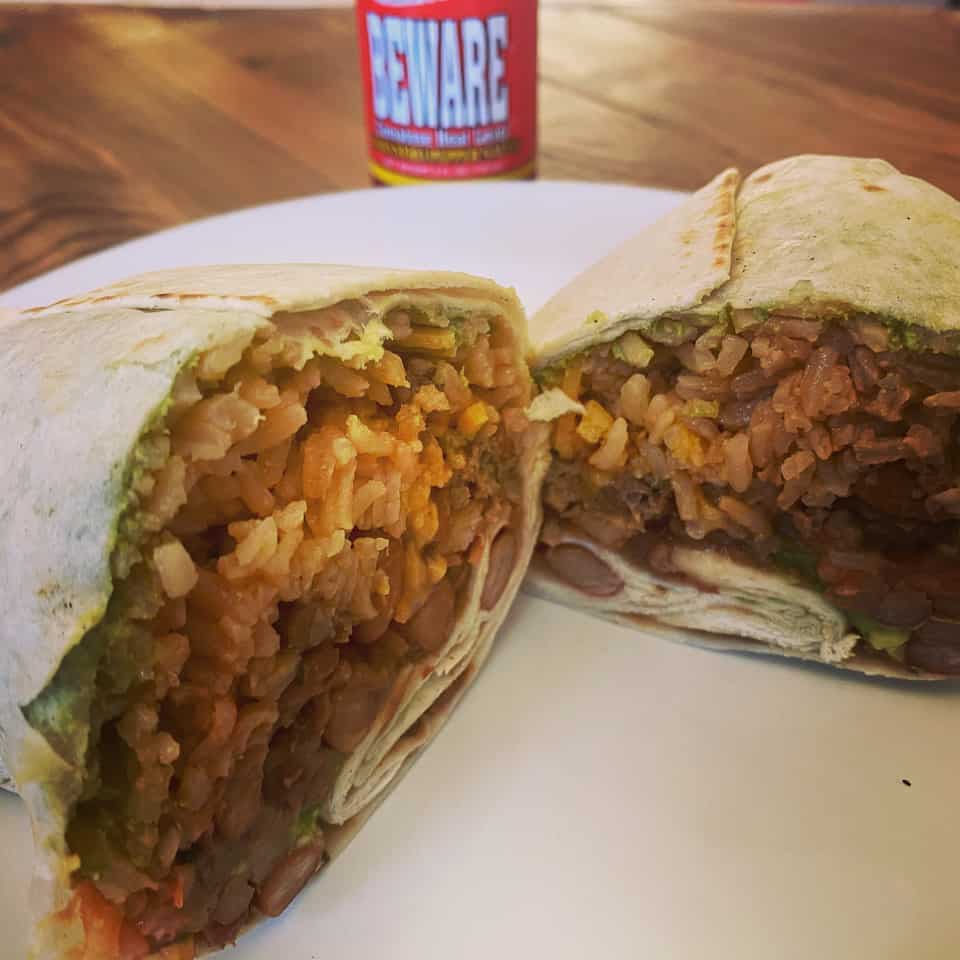
Vegan burrito from Botanas Fajardo. 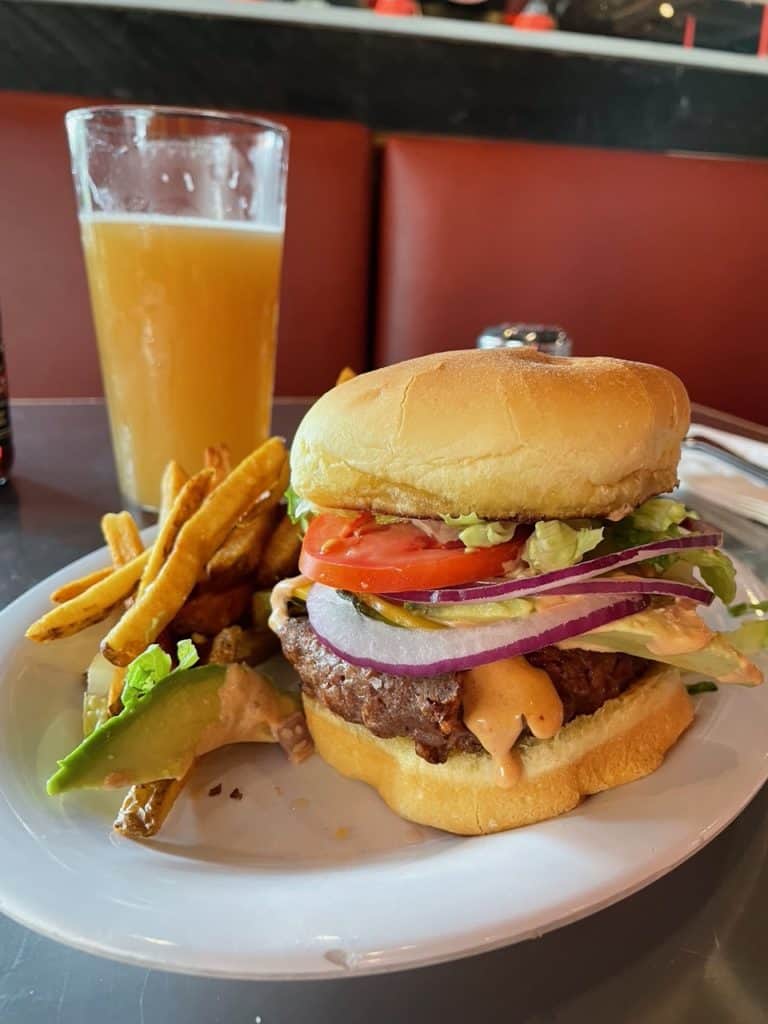
Southwest burger from Neo. 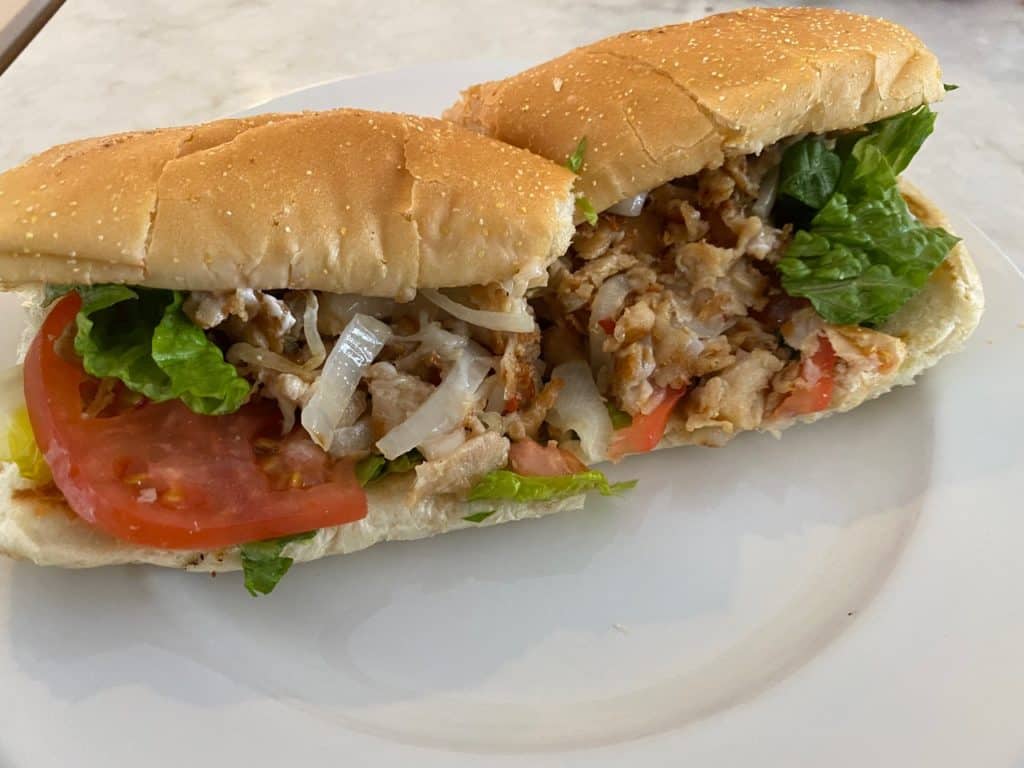
Vegan ‘chicken cheesesteak’ from Bread & Butter Kitchen. 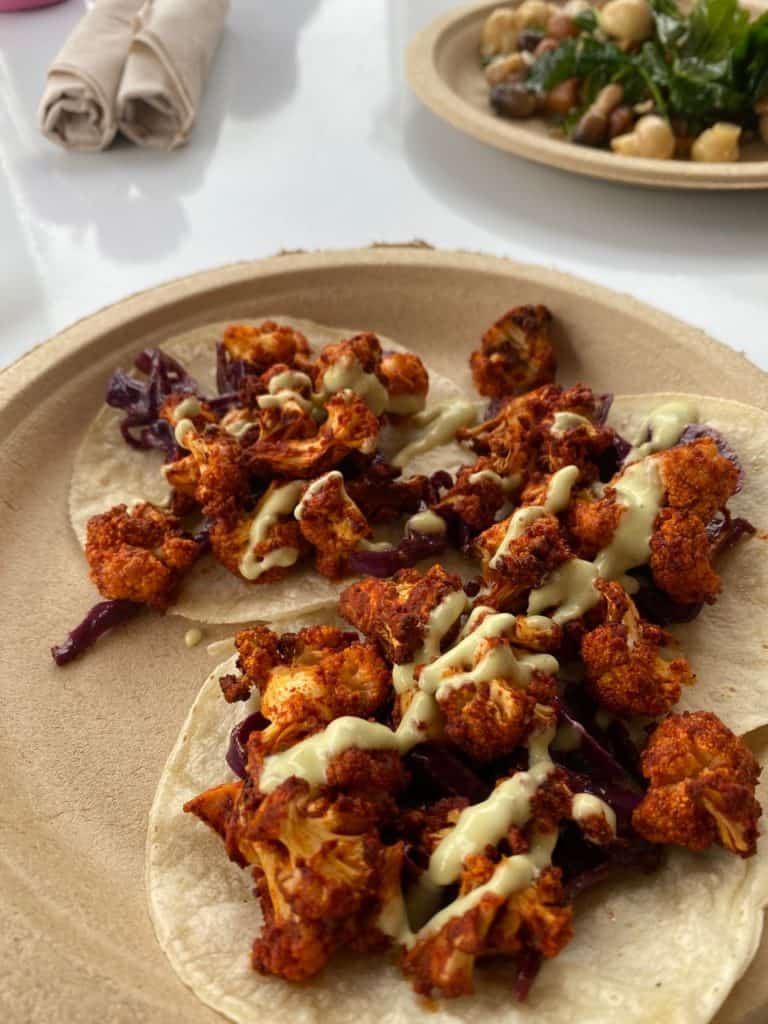
Cauliflower tacos from Forward Brewing. 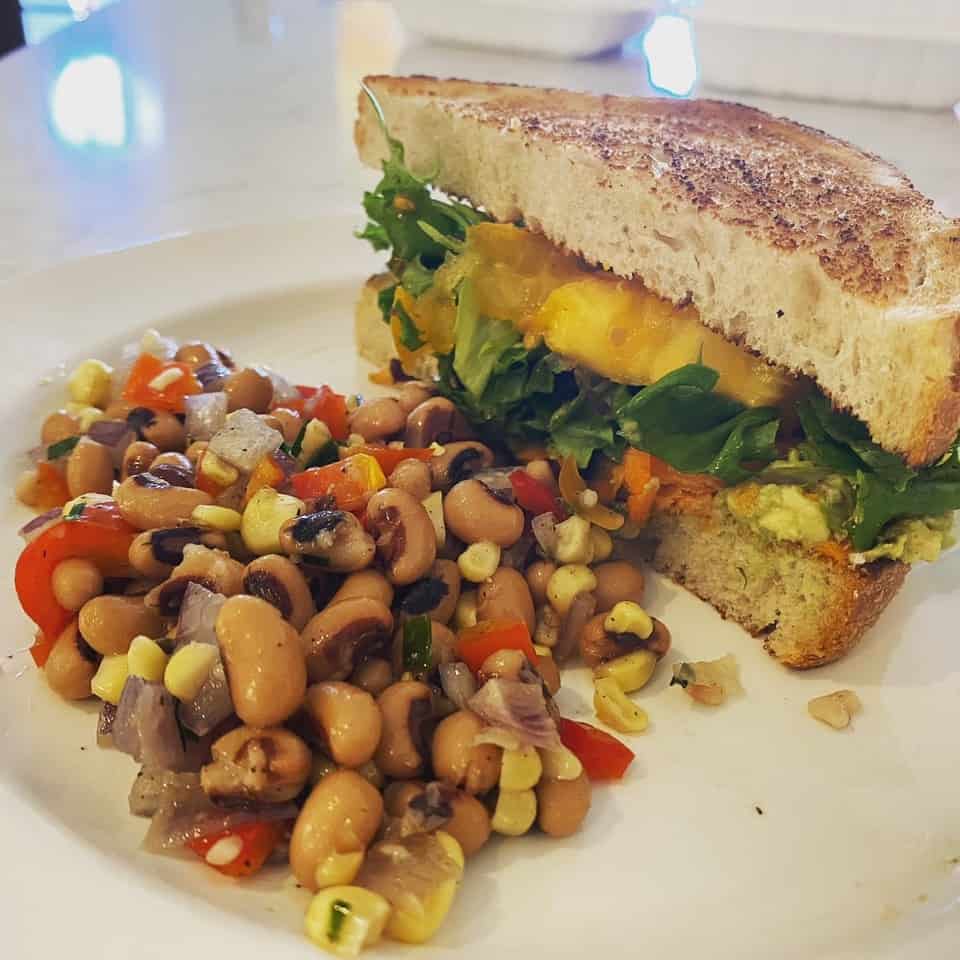
Vegan Park Place Powerhouse Sandwich w/ Black Eyed Pea Succotash from Miss Shirley’s Cafe.
James says options in the Annapolis area are getting better. “I love Annapolis, but it’s still not great for vegans. It’s exciting to go to other cities because the food scenes are simply better and more diverse. This was the main motivation in starting the AnnapolisVegan Instagram account and annapolisvegan.com.” He recommends Forward Brewing, Rutabaga, True Food Kitchen, Bread and Butter Kitchen and Tsunami which “all seem to go the extra mile to provide options for vegans.”
“The ‘Chicken ’Cheesesteak and fries from Bread and Butter Kitchen and the Vegan ‘beef’ burritos from Botanas Fajardo at the Eastport Yacht Club got me through lockdown. The Southwest Burger at NEO is really great (ask for roasted jalapeños). The Shiitake Mushroom Steamed Buns at Tsunami are super good. Finally, the cauliflower tacos, when they have them, at Forward Brewing are awesome.”
Fitting in Fitness in 2022
Maybe you have your nutrition all dialed in and it’s finding more time and motivation for a fitness routine that is on the top of your health to-do list this year. Enter wearable tech.
The American College of Sports Medicine has forecasted that “wearable tech” is the top fitness trend for 2022.
“Tech advances have made it easy for users to collect important health metrics and work with fitness professionals and health care providers to develop healthy lifestyles and increase quality of life,” said ACSM Past President Walter R. Thompson, lead author of the survey.
Some of the other notable trends in the survey were home exercise gyms, outdoor activities like walking, group rides and organized hiking, strength training with free weights, and exercise for weight loss.
When the pandemic shuttered gyms, exercise became something we streamed at home or did outdoors when possible. While most gyms and fitness centers have re-opened locally, they have also expanded their menu of at-home streaming workouts, virtual training sessions and outdoor classes. Expect to see these “hybrid gyms” become more common.
The pandemic shined a light on our health and many of us realized that being glued to the couch just wasn’t sustainable or desirable. We bought lots of home equipment (who doesn’t have a Peloton now?) and fitness trackers during quarantine, and we can only expect more of the same in 2022.
To all the vegans, the anti-dieters, the carnivores, the fitness junkies, the couch potatoes: Our wish for everyone in 2022, is that you stay healthy and well, whatever that looks like for you.
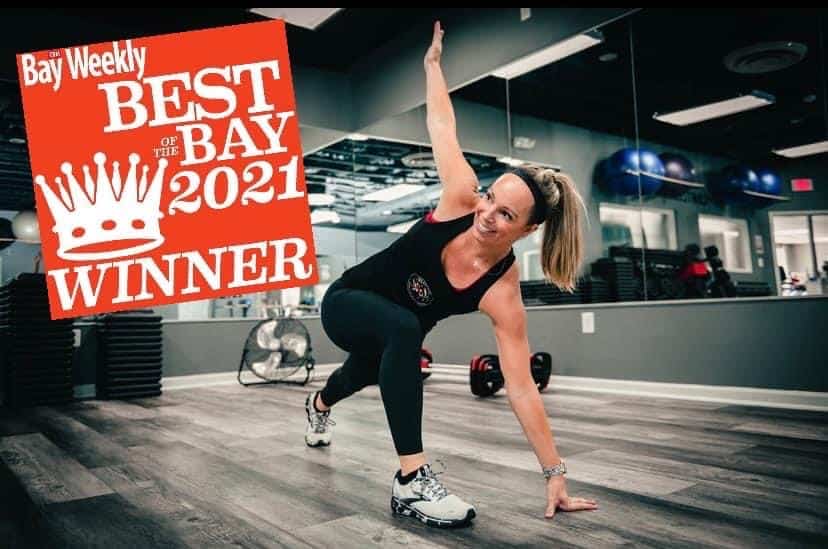
New Year, New ME!
January is a great time to set new health goals and create a plan to reach them. This can sometimes be intimidating…so don’t be afraid to start small. Write down your goals and then target them one by one. This way, you have small wins and don’t feel overwhelmed.
To get started:
- Write down your goals.
- Identify the challenges you will face in meeting your goals.
- Be organized and—most importantly—be consistent.
- Set routines and reminders.
- Find a buddy to help with accountability.
It’s important to cut yourself some slack and understand that life will get in the way…just don’t give up. Each day is a chance to start again. You are on your way to a NEW YOU…you got this!
–Vanessa Runion, Co-Owner of Chesapeake Health & Fitness Club
